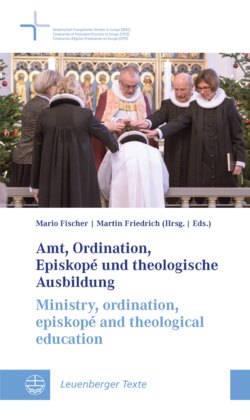Читать книгу Amt, Ordination, Episkopé und theologische Ausbildung / Ministry, ordination, episkopé and theological education - Группа авторов - Страница 13
1.1The challenge
Оглавление2. As already stated in the Leuenberg Agreement (LA) 39, differences in the order of ministries and the understanding and practice of ordination are not “grounds for division” among the member churches. This means that, regarding such issues, diversity in doctrine and order does not destroy the church fellowship among them. Nevertheless, with LA 39 the CPCE churches pledge themselves to study further these issues, especially where they pertain to “the remaining doctrinal differences that persist within and between the participating churches”. This obligation is a part of the churches’ shared commitment to “bear their witness and perform their service together, and strive to deepen and strengthen the fellowship they have found together” (LA 35).
3. The document The Church of Jesus Christ (CJC) adopted by the Fourth General Assembly of the Leuenberg Church Fellowship (LCF, now CPCE) in 1994, summarised the first round of talks about the question of ministry and ministries in the church. This document recognised that no consensus has yet been reached among the churches of the LCF, but that the Fellowship is “on the way towards consensus” (ch. I.2.5.1.1).
4. Differences in the shaping and ordering of ministries and the understanding and practice of ordination, while not calling church fellowship in word and sacrament into question, may nevertheless turn out to be obstacles for common witness and service. Among other things, differing convictions about the ordination of those who are homosexual and, in few cases, the limiting of ordination only to men have been seen as a burden for the fellowship between churches and within confessional bodies like the Lutheran World Federation and the World Communion of Reformed Churches. This means that, even though uniformity is not being claimed, a further convergence may be helpful for the deepening of church fellowship. This is all the more true, as the “further development of the structural and legal shape” is on the agenda of the CPCE for the sake of “strengthening commitment”.1 The legitimacy of diversity, but also the limits of diversity need further consideration (see below ch. I.4).
5. In addition to the need for internal clarification, the broader ecumenical context also challenges the Protestant churches of Europe to deal with questions of ministry, ordination and episkopé. On the one hand they ought to articulate jointly the basic convictions which unite them over these issues and to put these convictions forward confidently. On the other hand they ought to work for deepening their consensus especially in cases where unilateral decisions have caused conflict and stress in ecumenical relations. An example of this is the discussion sparked off, both within the EKD and in relation to the Roman Catholic Church, by the Bishops’ Conference of the United Evangelical Lutheran Church in Germany (VELKD) with its recent papers on ordination and commissioning.2 This example makes clear how important further work is on this topic. Last but not least, the CPCE churches need to discuss new ecumenical developments such as the new models of ecclesial communion between Anglican churches and churches of CPCE, such as the Meissen Declaration, the Porvoo Common Statement and the Reuilly Common Statement.
